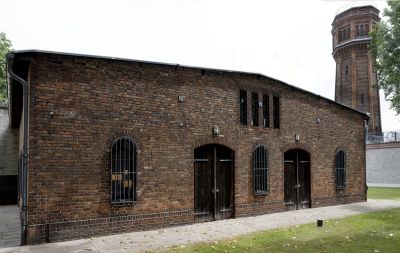TWO LIVES – ONE FATE: Irena Bobowska – Bronisława Czubakowska

And do not regret what has passed,
And do not fear what might come!
Irena Bobowska was born on 3 September 1920 in Posen/Poznań, where she grew up in a family that actively supported independence. She was also left reliant on a wheelchair for the rest of her life after contracting polio as a child.[2] Her strong personality and her will to live helped her complete lower secondary school and to develop her talent for music and poetry. She was also actively involved in social activities, such as a project which founded Poznań's first library for young people. In the summer of 1939, there was a recruitment drive for crew members for human torpedoes. The young woman volunteered for duty without telling her parents.[3] At the end of 1939, she joined the POZ (Polska Organizacja Zbrojna), a conspiratorial Polish military organisation, and in the spring of 1940, the Polish Military Organisation for the Western Territories (Wojskowa Organizacja Ziem Zachodnich). Irena Bobowska was a co-founder of the journal “Pobudka” (“wake-up call”), the mouthpiece of the POZ, and also contributed articles.
In June 1940, the young woman was arrested in Poznań. During the interrogations that followed, she was tortured physically and psychologically. She was beaten and humiliated, and her wheelchair was taken away from her. She was then taken to a prison in Berlin-Spandau and to the prison hospital in Berlin-Alt Moabit.
In August 1942, the higher regional court for Poznań met for an external session in Berlin during which three of the four defendants were sentenced to death for “high treason”. As well as Irena Bobowska, they included Stanisław Michalski, codename “Łoś” (elk), who worked for the “Kurier Poznański” (“Poznań Courier”), and Radziwój Zakrzewski, a businessman and member of the Scout movement. The fourth defendant, Herbert Lorkowski, was sentenced to six years in a penal camp.[4]
At dawn on 27 September 1942, Irena Bobowska was executed by guillotine in Berlin-Plötzensee.
“As I learn the highest skill in life”
To smile always and everywhere
And to bear pain without complaint,
And not regret what has passed,
And not fear what might come!
I tasted the taste of hunger
And sleepless nights (a long time ago)
And I know how the cold bites,
When you want to curl up
To protect yourself from it.
And I know what it means
To shed tears of helplessness,
By the light of day,
In the dark of night.
And I learned to accelerate the time,
Which so mercilessly drags on, with my mind,
And I know how much one must struggle with oneself,
Not to fall and not to tire.
This path seems endless...
And I am still learning the highest skill in life:
To smile always and everywhere
And to bear pain without complaint,
And not regret what has passed,
And not fear what might come![5]
“Her poetry not only spoke words of comfort and strength to her fellow sufferers, but also to the prisoners in Auschwitz concentration camp. After the war, she helped the political prisoners in [Bydgoszcz-]Fordon to survive,” write the authors of the “Polkopedia” article [online encyclopaedia on Poles living abroad - translator’s note].[6]
[2] Irena Bobowska’s father, Teodor, “returned to Posen after the outbreak of the Greater Poland Uprising and organised (...) the theft of secret German military documents, which were later transferred to the Allies. He took part in the [Greater Poland] Uprising”, reports Elżbieta Kargol in “Polkopedia”. He fought in the Polish-Soviet war, was taken prisoner of war by the Soviets after the German invasion of Poland, and was murdered in Katyn in 1940.
[3] Unlike the first human torpedoes (Bangalore torpedoes), which were used in the Sino-Japanese war (1937–1945), the Polish navy “did not plan the use of a suicide weapon for tactical reasons”.
[4] Copy of the judgement, file ref. 2 O Js. 89/42 (84), in the archive of the IPN (=Instytut Pamięci Narodowej; English: Institute for National Remembrance), see also: https://www.dziewuchyberlin.org/wp-content/uploads/2021/03/wyrok-IB.png
[5] Written in 1941 in Wronki prison (translated from the Polish).
[6] https://polkopedia.org/wiki/Irena_Bobowska (in Polish).














